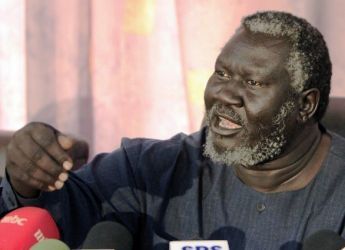SPLM-N disputes JEM leadership of Sudan rebel alliance
December,2015(KHARTOUM) – The leader of the Sudan People’s Liberation Movement-North(SPLM/N) Malik Agar Tuesday issued a statement contesting the leadership of the rebel alliance Sudanese Revolutionary Front (SRF) by Gibril Ibrahim, the chairperson of the Justice and Equality Movement (JEM).

Since, Agar and Gibril issue statements in the name of the rebel alliance, while reports commenced to mention the existence of unannounced divorce between the Sudanese rebel groups in Darfur region and the SPLM-N.
In a press release extended to Sudan Tribune on Tuesday, Agar said they read statements signed by Gibril Ibrahim as SRF chairperson, adding that this “unilateral step” deepens divisions between the opposition forces and distracts it from achieving its goals.
Disputing the legitimacy of Ibrahim’s election, the SPLM-N leader said he was not part of the meeting where JEM leader was elected for the SRF chairpersonship.
“The SRF Leadership Council did not hold any meeting since its last meeting from 13 to 17 October of the year 2015. As a Chairman of this Council, I did not call to a meeting since that date,” Agar said.
During their last meeting in the French capital, the rebel groups issued a statement announcing an unilateral six-month cessation of hostilities, and expressed readiness to participate in the preparatory meeting for the national dialogue, which aims to achieve peace and democratic reforms in Sudan.
However the participants wrapped up the meeting without a press release over the remaining items on the agenda.
Agar in his statement also pointed that the eastern Sudan opposition group, the United Popular Front for Liberation and Justice (UPFLJ) is represented in the SRF leadership council by the group’s leader Zainab Kabashi and Ossama Saeed.
It was not clear why he underscored the UPFLJ representation in this statement.
During the last SRF meeting in Paris, Kabashi supported the SPLM-N position, calling to achieve structural reforms before the leadership transition process which was agreed by all the members of the coalition.
Last November, the African Union High Level Implementation Panel (AUHIP), which brokers peace talks to end armed conflicts in Blue Nile and South Kordofan from one side and Darfur region on the other side, organized separate discussions between the rebel groups and the government.
During the opening session, the SPLM-N and two groups from Darfur region were keen to show unity and coordinate their positions.
The SRF was established in November 2011 between the SPLM-N and the three Darfurian groups. Its initial objective was to unify the joint military action of the rebel groups to topple down the regime of President Omer Hassan al-Bashir.
However during the past years, the SRF sought more to create a large political alliance with the political opposition forces inside the country to bring down the regime throup popular uprising or to reach a negotiated settlement.
(ST)
